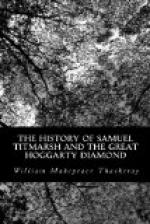“Nonsense, Mr. Smithers! Has not Mr. Brough five hundred thousand pounds’ worth of shares in the INDEPENDENT WEST DIDDLESEX, and is THAT at a discount? Who recommended my aunt to invest her money in that speculation, I should like to know?” I had him there.
“Well, well, it is a very good speculation, certainly, and has brought you three hundred a year, Sam my boy; and you may thank us for the interest we took in you (indeed, we loved you as a son, and Miss Hodge has not recovered a certain marriage yet). You don’t intend to rebuke us for making your fortune, do you?”
“No, hang it, no!” says I, and shook hands with him, and accepted a glass of sherry and biscuits, which he ordered forthwith.
Smithers returned, however, to the charge. “Sam,” he said, “mark my words, and take your aunt away from the Rookery. She wrote to Mrs. S. a long account of a reverend gent with whom she walks out there,—the Reverend Grimes Wapshot. That man has an eye upon her. He was tried at Lancaster in the year ’14 for forgery, and narrowly escaped with his neck. Have a care of him—he has an eye to her money.”
“Nay,” said I, taking out Mrs. Hoggarty’s letter: “read for yourself.”
He read it over very carefully, seemed to be amused by it; and as he returned it to me, “Well, Sam,” he said, “I have only two favours to ask of you: one is, not to mention that I am in town to any living soul; and the other is to give me a dinner in Lamb’s Conduit Street with your pretty wife.”
“I promise you both gladly,” I said, laughing. “But if you dine with us, your arrival in town must be known, for my friend Gus Hoskins dines with us likewise; and has done so nearly every day since my aunt went.”
He laughed too, and said, “We must swear Gus to secrecy over a bottle.” And so we parted till dinner-time.
The indefatigable lawyer pursued his attack after dinner, and was supported by Gus and by my wife too; who certainly was disinterested in the matter—more than disinterested, for she would have given a great deal to be spared my aunt’s company. But she said she saw the force of Mr. Smithers’s arguments, and I admitted their justice with a sigh. However, I rode my high horse, and vowed that my aunt should do what she liked with her money; and that I was not the man who would influence her in any way in the disposal of it.
After tea, the two gents walked away together, and Gus told me that Smithers had asked him a thousand questions about the office, about Brough, about me and my wife, and everything concerning us. “You are a lucky fellow, Mr. Hoskins, and seem to be the friend of this charming young couple,” said Smithers; and Gus confessed he was, and said he had dined with us fifteen times in six weeks, and that a better and more hospitable fellow than I did not exist. This I state not to trumpet my own praises,—no, no; but because these questions of Smithers’s had a good deal to do with the subsequent events narrated in this little history.




